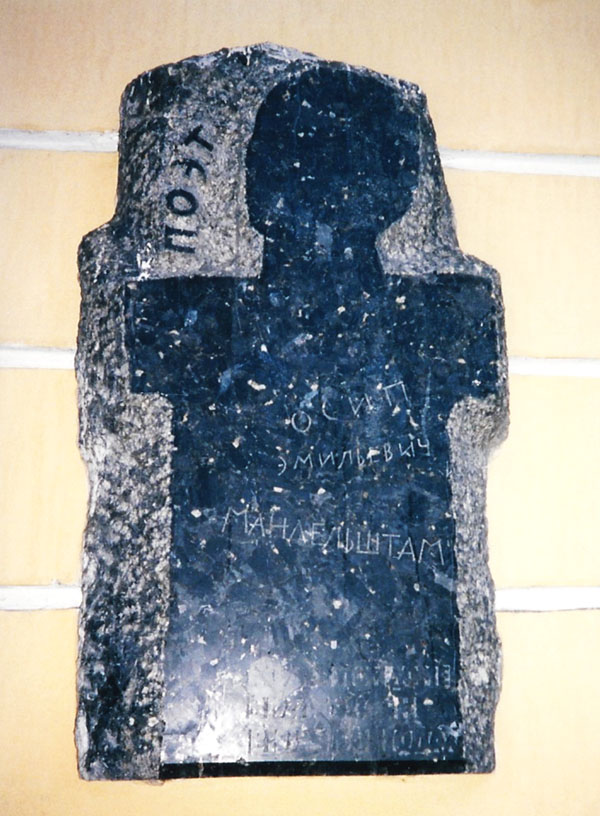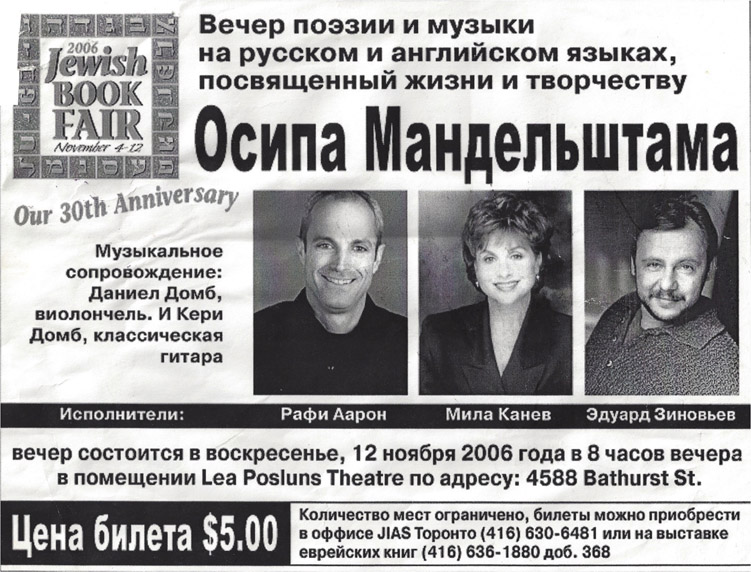SURVIVING THE CENSOR
The Unspoken Words of Osip Mandelstam (Seraphim Editions, 2006)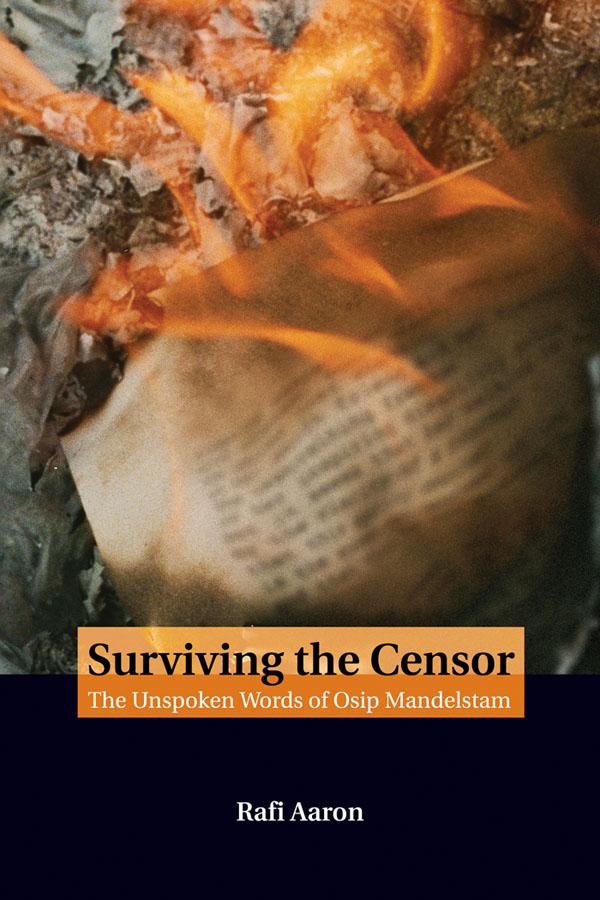
On May 13, 1934, Osip Mandelstam, one of the foremost Russian poets of the twentieth century, was arrested for creating and reciting a poem attacking Stalin. What made his act so noteworthy was that criticizing the regime at this time was unheard of. In a system that instilled fear in its citizens through mass arrests, torture, death and prison camps, silence was the norm. Artists ceased to create or became state controlled puppets. To fully comprehend how exceptional Mandelstam’s action was, we need only consider his contemporary Boris Pasternak, who wrote Dr.Zhivago. When this novel was published it was also a harsh judgment of the Soviet Union but it only appeared in 1954, twenty years after Mandelstam’s first arrest.
Surviving the Censor— The Unspoken Words of Osip Mandelstam (Seraphim Editions, 2006) allows the reader to experience life through the eyes of Mandelstam and his wife, Nadezhda, as they are persecuted by Stalin over a period of four and a half years. As the events unfold they are also recorded by an anonymous prisoner from Stalin’s camps and a researcher who is delving into the Mandelstam saga. These three voices follow the poet as he is arrested, sent into internal exile, released, and then rearrested. Finally the journey leads to a transit camp near Vladivostok, in the Soviet Far East, where Mandelstam died on December 27, 1938, at the age of forty-seven.
Even after his death Mandelstam was feared by the authorities both because of the example he represented and the power of his poetry, which in itself was considered seditious. They continued to bury the poet by preventing his poems from being published. The concluding section of the book describes how the poet’s works outlived those who attempted to ban them.
John Barton noted that Rafi Aaron’s poems “are powerful, evocatively imagined works, rich in detail and intellectual resonance.” They are filled with lyricism and leaping imagery that goes beyond the facts to convey the dark spirit of the times and illuminate those areas where little or no information exists.
In October 2004 Rafi embarked on a literary pilgrimage following the life and work of Osip Mandelstam (for an account of the trip see The Pilgrimage). While in Russia he met with Mandelstam scholars and visited places of literary significance. Rafi’s journey took him to St. Petersburg, where he delivered the Alexander Mackenzie Memorial Lecture, at the request of The Canadian Consulate.
In November 2006 Rafi participated in a bilingual evening of Russian and English, celebrating the life and work of Osip Mandelstam. The evening marked the closing event of the 30th annual Toronto Jewish Book Fair. Daniel Domb, one of Canada’s finest cellists, and Carey Domb, playing classical guitar, performed music that they created for a number of Rafi’s poems from Surviving the Censor. Eduard Zinoviev and Mila Kanev read Mandelstam’s poems in Russian.
Image on right: Plaque to Osip Mandelstam, 23 Tverskoi Blvd, Moscow
SELECTED POEMS
VORONEZH
(Nadezhda)
The darkness drops its anchor on our lungs and we
feel the weight of each breath. Here even the wind
is helpless as it breaks its back on our windows and
moans outside our door. I have ransomed my
memories from Moscow and soon I will be free but
the war goes on and they continue the assault on
the weakened walls, the burned-out interior, the
holy of holies where our thoughts are stored and
once again I am defenseless.
Listen: the footsteps, the voices, the ones that
speak for darkness and the ones that speak from
death, repeating their words, their warnings. There
is nowhere to retreat, the country is on fire and
people swim through the flames with fluorescent
arms,
Oh Voronezh!
dark and damp you entered the south side of my
bones, creaking opening the hinges that shivered in
my blood you sank your sonorous songs into my
soul. Your bleak sky is a fortune I have already
foretold, and I know this winter will never
surrender the earth, no it will hold on, cradling the
snow in frozen fists until its lips are blue and motionless.
Voronezh you are buried under glass, in a facade
of work and your habitual practice that leaves
boulders in the way of the blind. Here everything
has turned into a mystery, the old man playing the
balalaika without strings, the seasons marooned on
a calendar, and always the axe of the executioner
above our heads. Voronezh is this life or death?
And now I want to clear my throat and speak but
soon my mouth will be full of sand so I leave this
to the archaeologists who will dig up the facts one
bone at a time.
Voronezh I am calling to you across the years of
exile over ramshackle houses and a railway line
that leads back to civilization and through the
winters that never forget how cold life can be, and
somewhere out there on one of your hills the sun
was pinned at the point of the interrogator’s
question, then the light sank into the snow and that
is all, that is all.
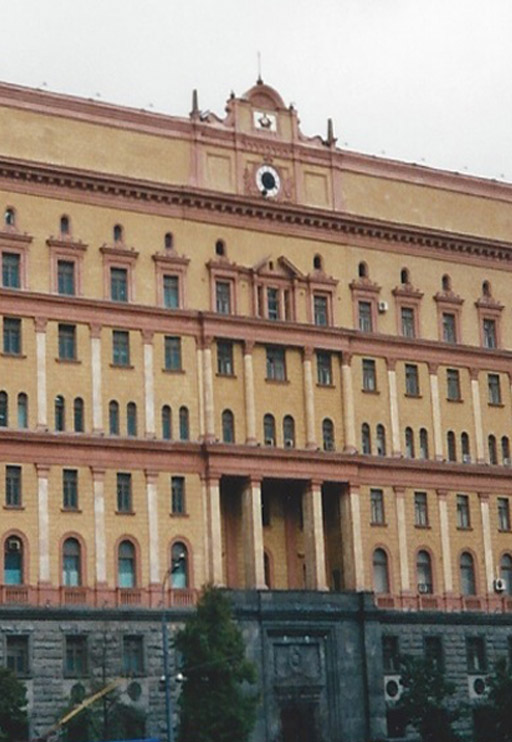
LUBYANKA
(The Anonymous Voice From The Camps)
I walk by your front door there is no one home.
The night is silent the leaves cautious as they move
down the street.
Lubyanka the century is shaking, every stone is a
tear, admit what you are: the half sister of truth,
the commissar of fear, and the poison the hungry
were fed.
I want people to know you are the four letters of
death, the chamber beneath the chamber, and a
word imprisoned in the mouth.
Yes this is the garden where summer was tortured,
where birch trees were stripped and the earth piled
high. Here we witnessed the suicide of the wind
flying into windows that never opened. After that
freedom confessed and the hours were led away.
Lubyanka— blue running for its life in a sea of
red, galvanized rain falling on the children, and a
bullet hole in the ankle of the dream.
And beyond the shadows where they work the
fields matching bone to bone, you are the prayer
for the dead tied to a whipping post that screams
out as another secret is exhumed.
Finally there is the story of the old man sailing out
of the front gate in a shoe, a fable perhaps, but here
how does one speak of reality?
FALLING
(Osip)
I am falling
backwards
into soft clouds
and empty years
falling
as only I could fall
with a whip and a prayer
over untamed memories
falling
until I was the black eye of the night
and the puffed eyelid that held the sky open
for the dawn, and then I was the sound
of a word awaking from dreaming
tongues on the rock face of a cliff
speaking in a voice that carries the wind
I am falling
like a snake charmer
poisoned by something I said
falling
as all good men fall
holding on to what made them good
falling
like the most delicate creation, fluttering,
spinning through light,
as if
I had practiced this falling
I hear the rattle of keys and sounds that were chained
to the ear for centuries slipping away, the meat cleaver
lands softly, the swan’s wing thrashes water into waves,
and when the sky opened lightning curled
out of a cloud eluding thunder forever
I am falling
like the years
that never stop falling
all that separates me from this world is a concrete veil,
the wings of a seagull searching for a body
and the story of soft flesh
I am falling
with the weight of my knowledge,
the force of a glacial hammer pounding out
a continent where I will live, the wind wraps me
in a summer breeze
And I am falling
with the great light, fractured, wounded and white
falling
like a mirage after the tongue
tastes the desert
I am falling
out of the sky
black and terrifying
as if I will bolt into lightning
or point an electric finger
at my accusers
a man without a body
and so I am falling
out of my name
the night poured itself into twilight, the blue scales
and the orange tail of the sun splash frantically
in their final moments, a warm wind rises to confront
the season and a face that is no longer mine
and the candle that would have burned
for years, and darkness spills over the brim of the earth
I called out to hear my voice one last time
but it had already fallen through me
The curtain opened
and I am falling
through the stains
that cover my country
and the names of those
who had yet to be named
the winter winds
touch my cheek
the carnival is over
the wheel stops
and I am falling
through the cold creak
of my veins
and I froze
and I fall
to a place I cannot describe
because I fell
through my words
and as a poet
this is how I know
I had come to the end
of my fall
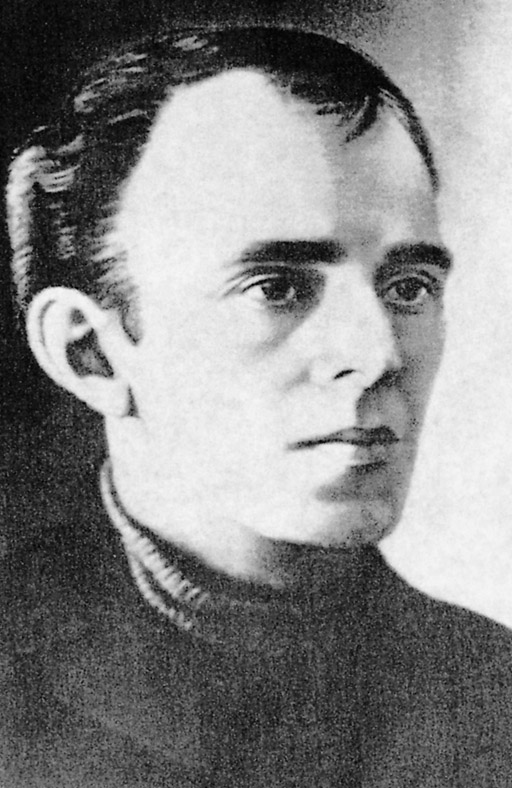
I Would (If I had one more night with you)
(Osip)
I would want you to hear the voice of starlight and
the moonless choir, the weeping willows and the
ferns straightening themselves into strings. I would
have led you to a forest and gathered these sounds,
encircled them with faded stars that I would polish
for you the way the elderly gentleman on Debinsky
Street used to shine his medals, with a loving hand
and focused eyes that never betrayed the battles he
had fought.
We would have walked to a clearing and stood ten
paces apart so I could watch your small hands
perform their everyday magic. And as the sky
closed in on us I would have removed the white
linen from the family chest, waving it like a flag,
surrendering the moments of my life without you.
I would if I had one more night with you watch the
spectators rise to their feet as I entered the arena to
face my fate, and there I would burn like the final
hours of summer, heroically throwing the last lance
of light precisely at the spot where darkness entered
your eyes. And then I would seal the wound that
watered the earth, cauterise our time with the fire of
a language I was learning to speak and a kiss that had
gone astray.
I would if I had one more night with you slander the
season for all its beauty and warmth, swim in my
own tears, scuttle our memories so they’d drown
before my death, so the weight of my name would
no longer bear down on your days.
The Last Poem
(Researcher’s notes #13)
When I came to his last poem I cried thinking this was
the end. Days and nights, nights and days shuffled on. I
too could have been someone or something but I
stopped by this well to drink the last word to watch the
seasons change and to unmask the fruit behind the
thorns.
Here I lived, ate and slept waiting for the bluebirds to
summon me each morning. I tallied up my emotions
(with a small piece of chalk), felt the spears of sunlight
through the clouds and anointed the words that had
blessed me. And those ideas that returned home from
their maiden voyage were restless and paced all night
in the attic. Life was filled with the sounds of
weightless feet in worn slippers and the threading
thumbs and thimbles of spiders who laboured to
reinforce the weakened dam of days that was flooding
into years.
Sometimes in my sleep the poems tap me or flex their
muscles as they push aside dreams. And then there are
collapsing roofs, ransacked images and streaks of
lightning tethered to green strings, and finally a tune
runs away with the words. Look! This was how I
discovered the world was off course, by sinking with
the ship, counting coral and holding on to his poems
for dear life so that when I awoke in a country near the
equator the words were stripped down to their
meanings and oh how they carried themselves so erect
so proud!
And now to say that the world went on, that laughter
choked and almost died, that miracles were worked or
postponed in a back room or a barn, that people swam
in streams of blood, that my sister was called
compassion and my brother was called something else
is not important.
I am here on the other side of the century. Stalin is
gone. Mandelstam’s poems wave from mast heads and
flag poles they knock on doors and leave fingerprints
for visiting cards, they stretch out in open fields or sit
in cafés where they trick tongues into leaping over
borders, years and unmarked graves, breeding the
flames that ignite the warehouse of words. To stop here
is impossible, winter is coming, I wrap myself in a
verse and head for the mountain pass where I can
watch the poems as they migrate to the grazing lands.

3-5 Furmanov Street
(Researcher’s Notes #5)
A pilgrim I take off my shoes and walk up stairs
that have crumbled years ago. I kneel where I need
to and recite what I know. This place is filled with
one-eyed dogs, black magic and words that
hibernate and somehow rise on the coldest of
nights to warm you.
It was here that the riverbeds were sucked dry, that
the wind coughed and spat out a tooth and some
old litanies and a childless mother walked by
swaddling her dreams. Then the storm arrived with
its mallets, hammering a sheet metal sky.
On the night of the 13th, they came for you. On the
night of the 13th dark clouds were busy stalking
shadows, straw men were stuffing scarecrows, and
a circle was drawn around the corpse of a city. On
the night of the 13th an unwed star touched the
white shoulder of the moon (or so it was recorded),
four men and one informer pried open the casket
of fear; gray hair, dead eyes and disease fell to the
floor. The song had begun, no one would mistake
the melody.
Old friend, the incision is deep. They have struck
the heart, your poems are turning red. The
emptiness fills everything, it roams through this
space and is larger than the house where you once
lived. The breeze from the hill sits quietly on a log
paying its respects, and a song is played on a flute
by someone who has never heard happiness sing.
I wonder down corridors that do not end. I journey
on snowshoes over frozen fields until I reach the
lilacs of summer. It is here where I set up my tent,
here where nostalgia is performing a three-act play
no wants to remember.
And now to pretend that this place never existed;
to destroy it, to abandon it, to erase it from the
memory of brick and mortar to bend it until it is
bowed. And so they continue to bury a man who is
already dead. But the ghost is not silent he calls
out his name and reads what he has written.

Rafi with Eli at the Jewish Book Awards in June of 2007.

